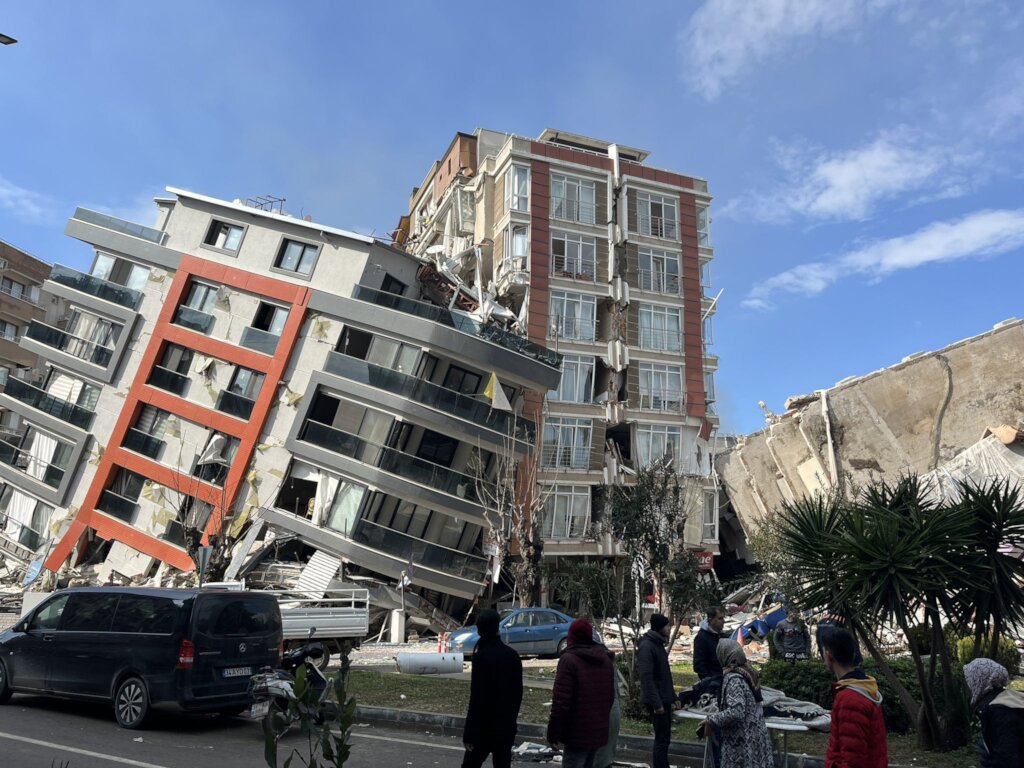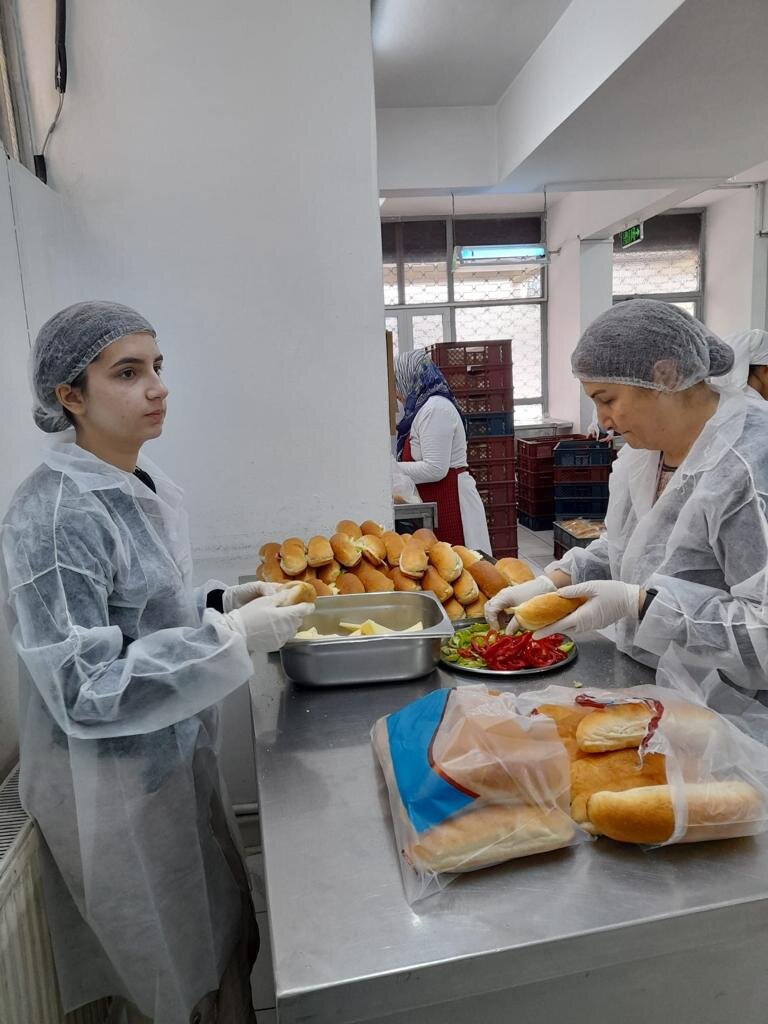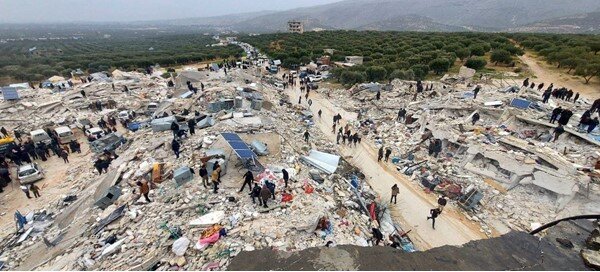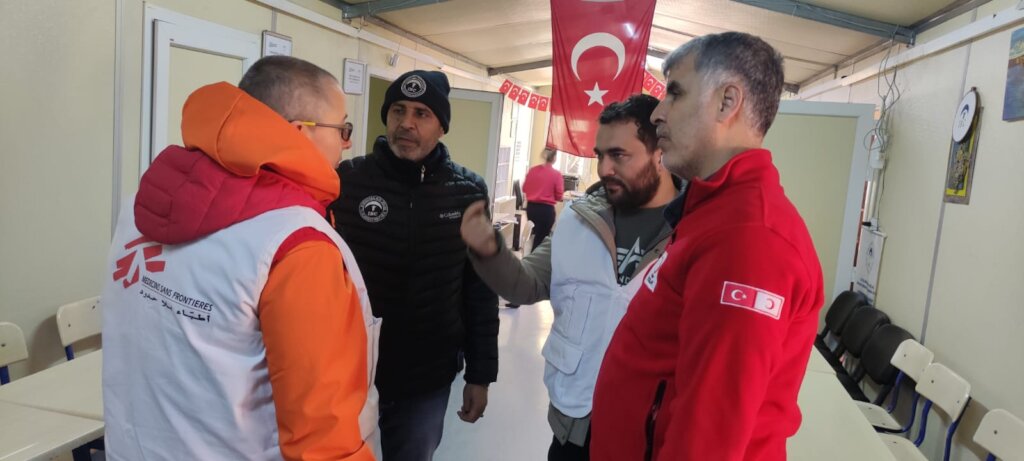By Amber Cakar | Grants and Partnerships Manager
“We cannot express through words about what we saw, everybody feels desperate against the destruction.”
-IBC Team on Türkiye-Syria Earthquakes Assessment
International Blue Crescent Relief and Development Foundation (IBC) would like to extend our sincere condolences to all those affected by the earthquakes this week. IBC employees in the region are safe and accounted for, though some have lost family members and loved ones and saw their entire homes destroyed. Thank you to all who are mobilizing and to the heroic search and rescue teams on the ground. Immense and continued cooperation is needed to prevent further loss of life and suffering.
Day 6 Developments
Over 28,000 people are reported dead so far in the aftermath of 7.8- and 7.5-magnitude earthquakes that rocked southern Türkiye and northern Syria just hours and kilometers apart last Monday, February 6th. According to the Ministry of Interior Disaster and Emergency Management Presidency AFAD, 24,617 people lost their lives in Türkiye, while Syrian Government and opposition forces reported 3,553 lives lost in Syria. UN officials say these numbers are likely to double in the coming days as search and rescue shifts into recovery phase on the heals of 2,103 aftershocks in the past 6 days.
In Türkiye, the three most affected provinces by number of deaths are located in Hatay, Kahramanmaras, and Gaziantep; in addition to these three provinces, seven others have been declared under a state of emergency by the Government of Türkiye for three months including Adiyaman, Kilis, Osmaniye, Malatya, Adana, Sanliurfa, and Diyarbakir. So far, at least 80,000 people survived with injuries and 106,428 disaster victims have been evacuated from the 10-zone region to other provinces, according to AFAD. Over 32,000 search and rescue personnel were on the ground, including 8,294 international personnel coming from 100 countries to join the efforts. Regular search and rescue has ceased in Kilis, Sanliurfa, and Gaziantep and more attention is being put toward the hard-hit provinces of Hatay, Karahmanmaras, Adiyaman, and Malatya. Over 6,500 buildings have collapsed in Türkiye, leaving hundreds of thousands homeless in the freezing cold; shelters and evacuations are not enough yet and the situation is dire for those still left on the street. Some airports and infrastructure has been fixed, providing better access to personnel, medical teams, and volunteers but 13.5 million people have been affected in Türkiye and most need help.
Likewise in war-torn Northwest Syria the UN says up to 5.3 million people are homeless and nearly 900,000 people are in urgent need of hot food in both Türkiye and Syria. The Türkiye earthquakes hit the hardest in 5 governorates in Syria including Idleb, Aleppo, Hama, Latakia, and Tartus. On day 6 of the relief efforts a second UN-convoy of 14 trucks supplied by IOM crossed the border with essential relief including items specific to earthquake recovery not found in the first delivery days before. According to the UN, only 5% of the impacted sites and towns in opposition-controlled areas of Northwest Syria are being covered by search-and-rescue operations. Due to the damaged crossing, access was delayed in providing cross-border aid in the first days of the emergency. In addition, more than 30,000 displacement movements were recorded in the area during the week after the collapse of a dam caused flooding and further destruction of homes. Ninety percent of the population in Northwest Syria already depended on humanitarian assistance. Save the Children warns that “the future of an estimated 7 million children affected in Syria and Türkiye hangs in the balance.”
IBC in the Field
International Blue Crescent Relief and Development Foundation (IBC) has been on the scene since the earthquakes took place, with its main hub at IBC Kilis Community Center. Since the first day, over 1,000 community members gather regularly at the Center providing hot food, soup, shelter, and emergency items, many staying overnight. As IBC had existing locations in Kilis, Gaziantep, Sanliurfa, Hatay, and A’zaz implementing humanitarian and development programs before the earthquakes, over the first few days IBC met with representatives of AFAD, local municipalities, governorships, and local stakeholders to assess the situation and coordinate an effective and timely life-saving response, agreeing on plans and joint implementation.
On Wednesday, IBC Field Team met with the President of the Turkish Red Crescent, Adnan Erdogan as well as Anne Cecil from Doctors without Borders at IBC Kilis hub to talk about the basic needs in the city, especially provision of ready-made meals, blankets, and tents. It was agreed to begin cooperation to increase daily meals from 5,000 3x per day to 6,000 meals 3x per day to meet the growing needs. Visits were made to the current distribution points in Kilis including 2,000 people at the main sports field, 1,000 people at IBC Community Center, 2,000 people at the University of Kilis, and 1,000 people in the center of the city’s cemetery. In addition, 4 large tents were built to shelter families in the area and through the new agreement, IBC and partners will provide these tents with food as well.
Beginning Thursday, IBC President Recep Uker, together with Program Directors Nalan Uker and Tolga Baca, Cross-Border Programs Manager Muhammed Assaf, Regional Coordinator Alper Mavi, and Program Coordinator Ekin Dallar have been undertaking assessments of the situation in Kilis, Gaziantep, Sanliurfa, Hatay, Kahramanmaras, and A’zaz. Yesterday IBC team visited the hard-hit districts of Islahiye in Gaziantep, and Iskenderun and Antakya districts of Hatay and started working to provide urgent needs of the region for food, clothing, heating, and shelter. Together with partner International Development and Relief Foundation (IDRF) Canada, IBC Kilis Community Center provided hundreds of hot meals and emergency support to 1000 families staying in the vicinity, as well as support to the 9,000-person municipality-run reception center in Sanliurfa.
In Gaziantep and Hatay, IBC team saw the destruction of the earthquakes firsthand in disbelief. When asked about what the feelings and sentiments are on the ground, it was stated: “There is a huge destruction on the ground, we cannot express our feelings through words about what we saw, everybody feels desperate against the destruction.” Colleagues said that the needs have changed a bit in the last hours whereas food is being provided in many places but shelter provision is urgently needed, tent or prefabricated units also work, baby care kits, thermal clothes, blankets, and generators are needed urgently. Hundreds of thousands of people are still homeless in the freezing cold conditions even among evacuations. The 10-city zone was home to around 15 million people before, including 1.7 million Syrians living under temporary protection. Notably, although there have been reports of harsh violence happening on the ground, this was not the experience of IBC staff- rather, in all locations visited this week, IBC field staff saw that all stakeholders were operating in full force and coordination with a massive operation on the ground led by AFAD, UMKE (medical teams), Turkish Red Crescent, the Turkish Military, volunteers, NGOs, local municipalities and governorships. IBC team confirmed that soldiers are trying to support rescue teams and maintain control, everyone is trying to do their best but its just still not enough.
In Northwest Syria, IBC and partner MSF assessed 4 areas including Atmeh, Ad Dana including Termanin, Sarmada, and Altareb finding that 242 families had lost their homes fully and more than 825 were damaged partly, leaving 1,100 families in need. There were 350 reported deaths and more than 3,000 were injured. In addition, IBC Cross-Border Programs Manager Muhammed Assaf attended the OCHA Northwest Syria Health Cluster meeting where it was reported that the highest casualties and death cases were in Harim/Idleb, Afrin, and western Aleppo governorate. There were reports of damage to the infrastructure of the small amount of health facilities which had still been running, therefore suspending service provision and activities. Other affected areas discussed were Jenderes, Atarib, Sarmada, A’zaz (IBC’s office is moderately damaged), Suran, Al-Bab, and Jarabulu. Lists of medical and other needs were provided to Mr. Assaf and partners agreed to continue to share updates from the ground. IBC stands in solidarity with hundreds of humanitarian colleagues in Northwest Syria and the global community calling on all governments and international aid and development organizations to urgently scale up humanitarian access and earthquake relief efforts in Northwest Syria to prevent further loss of life and suffering. Currently, the Government of Türkiye is still negotiating two potential alternative border crossings and exemptions have been waived on sanctions from foreign governments to allow much needed funding to the relief efforts but this is not enough. After 12 years of war, the Syrian people and aid workers in the region are exhausted from continuously underfunded and under-cared-for strategies to empower local communities out of humanitarian aid dependence. Urgent mobilization, support, and solidarity need to be put into action immediately to recover what is left of Northwest Syria; humanity first and foremost is of utmost importance.
For the survivors, IBC is working tirelessly to provide food, water, shelter, warmth, and essential needs. Headquarters staff, in concert with global partners, are mobilizing flows of vitally important medical supplies, food, hygiene kits, and basic needs equipment to fulfill the needs of the earthquake victims. Personnel on the ground continue to operate crucial, lifesaving operations while plans to expand and intensify activities are finalized.
For now, IBC Kilis Community Center continues to serve as a major hub for coordination and relief efforts, including for cross-border response into Syria.
As a result of the assessments undertaken by IBC field staff and partners so far, IBC has been taking the following actions:
IBC Activities in development in Türkiye:
Multiple Locations
o From each center, daily food, hygiene materials, blankets and hot meals for 1,000 people will be distributed
Hatay with Action Medeor
Islahiye/Gaziantep with Action Medeor
Kahramanmaras
IBC Activities in development in Northwest Syria (NWS)
Ad Dana, Sarmada, Atmeh together with Doctors without Borders (MSF)
A’zaz
Al-Bab
**IBC would like to thank its generous partners, donors, and their networks so far who have allowed us to respond urgently to this devastation that has shaken the region to its core**:Doctors without Borders (MSF), Action Medeor, UMCOR, World Jewish Relief, IDRF Canada, GIZ, Together Rising, WHH, IMC, JDC, Muslim Charity, Committed, Corus International, Bridge, and GlobalGiving
Urgent Needs in General:
Even after six days, needs in the region are insurmountable. Medical and general evacuations continue to take place; shelter/tents, thermal clothing, heat, water, power supply, and medical aid are urgently needed. The damage done to roads and infrastructure has made many areas simply unlivable.
IBC will keep all partners and potential donors appraised of the current situation daily.
We ask our partners and international civil society members to help us in these tragic days so that together we may overcome the suffering of our people.
----
Links:
Project reports on GlobalGiving are posted directly to globalgiving.org by Project Leaders as they are completed, generally every 3-4 months. To protect the integrity of these documents, GlobalGiving does not alter them; therefore you may find some language or formatting issues.
If you donate to this project or have donated to this project, you can receive an email when this project posts a report. You can also subscribe for reports without donating.
Support this important cause by creating a personalized fundraising page.
Start a Fundraiser


